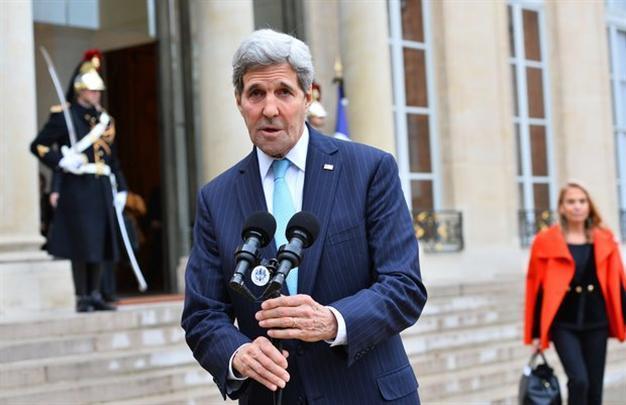US, Turkey working to finish shutting northern Syria border: Kerry
PARIS

AA photo
U.S. Secretary of State John Kerry said on Nov. 17 the United States is starting an operation with Turkey to finish securing the northern Syrian border, an area that Islamic State of Iraq and the Levant (ISIL) militants have used as a lucrative smuggling route, Reuters reported."The entire border of northern Syria - 75 percent of it has now been shut off. And we are entering an operation with the Turks to shut off the other remaining 98 km (61 miles)," he said in an interview with CNN.
Kerry arrived in Paris on Nov. 16 to pay respects to victims of Nov. 13 militant attacks that killed 129 people.
The area where the operations would take place is now controlled by the radical Islamists. The United States and Turkey hope that by sweeping ISIL from that border zone they can deprive it of a smuggling route which has seen its ranks swell with foreign fighters and its coffers boosted by illicit trade.
Under a long-discussed joint U.S.-Turkish plan, moderate Syrian rebels, trained by the U.S. army, would be expected to fight ISIL on the ground and help coordinate air strikes by the U.S. coalition, launched from Turkish air bases, under the strategy drawn up by Washington and Ankara.
“Our joint fight with the United States against Daesh is going on. Joint steps will be taken as part of this fight in the coming days,” Turkish diplomatic sources told Hürriyet Daily News upon Kerry’s statement, declining to elaborate on the content of those steps.
Diplomats familiar with the plans have said cutting off one of ISIL's lifelines could be a game-changer in that corner of Syria's complex war. The core of the rebels, who number less than 60, would be highly equipped and be able to call in close air support when needed, they say.
But there are major challenges.
Turkey is distrustful of the People’s Protection Units (YPG), the military force protecting the northern Syrian region of Rojava, which has proved a useful U.S. ally in fighting ISIL. It controls adjacent territory on the eastern side of the Euphrates river, just across from Karkamis and the jihadist-held town of Jarablus. Ankara wants it to advance no further and considers the Euphrates a red line not to be crossed.
Earlier, speaking to reporters after meetings French President Francois Hollande and Foreign Minister Laurent Fabius in Paris, Kerry said increased coordination with Russia in the fight against ISIL militants would require progress in the political process to end the Syrian war.
Kerry said agreements reached last week at Vienna peace talks on Syria, meant the country could be "weeks away, conceivably, of a big transition."
Kerry referred to independently conducted U.S. and Russian air strikes in Syria.
"At the moment, it's matter of making certain we are hitting the right targets and we are not running any risk of conflict among ourselves," he said. "But it's possible that if the political process moves more rapidly, there could be greater level of exchange of information and so forth.
"Iran, Russia ready for a ceasefire, the United States ready for ceasefire," he said. "But there needs to be legitimacy to this process. So the faster Russia and Iran give life to this process, the faster the violence can taper down and we can isolate Daesh (ISIL) and al Nusra and begin to do what our strategy has always set out to do."
He told CNN that there was now an opportunity to make a quick breakthrough.
"(It) gives us an opportunity to perhaps get a ceasefire in place within the next three, four, five weeks. And then be able to, with the political process, work with other parties to again squeeze harder on Daesh," he said.
















